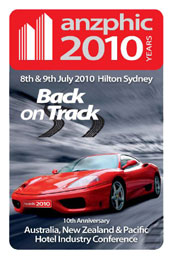Asia: ANZPHIC ’09 dishes the straight talk to Down Under insiders

Intent on “Staying the Course,” 350 optimistic delegates attended the Australia, New Zealand & Pacific Hotel Investment Conference in Sydney 2-3 July. They absorbed presentations by industry experts who minced no words about how best to stay afloat in this stormy and perilous economic sea.
Conference opener John P. Smith, managing director and principal, HTL Capital Advisors & Horwath HTL Australia, showed a nail-biting clip from the film, “The Perfect Storm,” and predicted that neither Mother Nature’s relentless battering nor the global financial crisis would sink the ship.
Attendees received a pedometer whose box bore a relevant Winston Churchill quote: “When you’re walking through hell, keep walking.”
Heaven’s polar opposite was referenced again as the opening panel paid irreverent tribute to the blatant and infamous 2006 Tourism Australia advertising campaign, “So Where the Bloody Hell Are You?” It was, after all, the question on everyone’s minds.
Slated to answer regarding the economy were Frank Allen, director, property markets, Westpac Banking Corp.; on hotel markets, Jonas Ogren, area director Asia – STR Global; and on the airline industry, Ian Thomas, managing consultant, CAPA Consulting.
“The difficult times are far more difficult than were actually predicted last year,” Allen said. Acknowledging the worst global recession in 70 years, he predicted that the global economy would contract by 2 percent this year. Allen called the outlook for the Australian dollar mixed, resulting in more Aussies remaining onshore while the number of international visitors slows.
“Half a million new immigrants in two years is a huge new market and they want to see their new country,” Allen said.
If the global recession worsens, Australia’s performance likely won’t be as weak as the rest of the world, he said. Consumer sentiment is lifting, but is expected to be tested in the second half of 2009, with the Australian government taking a proactive stance, investing at a higher rate than in past recessions to save jobs and boost confidence.
“Interest rates are set to remain at 40-year lows until the economy recovers late in 2010,” Allen said.
Prudent action vs. reaction
With hotel markets in “severe negative territory in all respects,” Ogren warned of the hazards of discounting.
“But who is listening?” he asked. “In an up market, everyone follows the best practices of the market leader, while in a downturn everyone follows the first person to panic.”
Those who hurry to drop rates might shoot themselves in the foot and it doesn’t mean people will fill hotels, he said. Discounting often can double a loss: markets generally take years to recover, as in U. S. post-2001, after which six years passed before the market rates returned to a comparable level.
Hotels do have control over rates, he asserted, and the key is to offer the right discount to the right person at the right time.
“Many hotel companies, particularly independent hotels and smaller groups, may not have revenue-management structures in place from a corporate standpoint,” Ogren said. ”It’s important to know, if the whole pie is shrinking, what is your piece? Budgets and forecasts may be difficult to follow, yet understanding of market share is always important.”
Ogren said the global decline is likely to continue till year’s end, accentuated in this region by supply growth in Asia. But Australian markets are relatively strong and this could be the beginning of the comeback, he said.
No industry would welcome a comeback more than airlines: airplanes bring people who stay in hotels—or at least they used to. If it seemed hotels were singing the blues, 41 scheduled airlines have gone out of business in the past 12 months, reported Thomas. He sees Europe as most affected, but Australia lost critical MacAir service in Queensland.
To blame worldwide: rising jet fuel prices, yields and profitability in freefall, receding world markets, decline in capital values, tightening credit conditions, collapse in global trade and premium demand dissipating.
“We’re witnessing fundamental changes in travel behavior,” Thomas said. “Plus, with yield decline triggering aggressive fare pricing, the inevitable outcome is more red ink.”
A full recovery in passenger traffic is likely to be two years away, with average load factors at 71 percent and the world’s airlines set to lose US$9 billion in 2009. Bad for airlines, but mixed blessings for travelers: International airfares are at the lowest level in real terms in 25 years as airlines ground aircraft and withdraw from nonperforming markets. Full fares will hold firm as the real market battle continues in the discount segment.
Thomas predicted that recovery is still “not convincing,” that inbound growth will remain flat, Japan will not likely re-emerge as a strong market, long-haul markets will still be difficult, premier traffic won’t resume rapidly, orders and delivery of the Boeing 787 will incur further slippage, and the H1N1 virus will “hang over” travel…like a plague.
What’s hot? China, and possibly Korea; the Middle East with continued expansion, albeit slower than this year; low-cost carriers stealing market share, premium economy on more carriers; and capacity slowly returning to the market.
Digesting the unpalatable realities, ANZPHIC organizers and attendees “still wanted to stay on course in expanding this event,” Smith said, “and this is a remarkable result. Those hidden icebergs all appear to have risen to the surface.”
Glennyth Leuzzi
Horwath HTL Australia Pty Ltd
+61 2 9320 1755
Horwath
